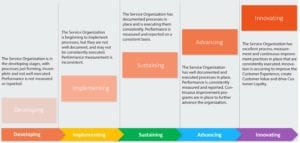
How Mature Is Your Service Delivery Model?
Technology and process are the foundation of your service delivery model. The appropriate use of technology will allow you to build an efficient model that can scale to meet your clients’ needs. If you fail to leverage technology as the foundation of your delivery model, you will miss an opportunity to stay competitive in the market. Many service organizations fail because of their inability to leverage technology. As a result, it is important to fully understand your technology options as you build and adapt your service delivery model.
There are several evolving technology innovations that will help form the future of the service industry. Here are the key enablers:
- IoT and predictive enablement
- Social communication
- Service channels (omni-channels)
- Remote service and augmented reality
- Field service and logistical innovation
- Retroactive enablement
- Unstructured data analytics
Service Maturity Model
Service maturity and technology maturity are closely related. The Service Maturity Model was developed as an assessment tool for the globally recognized Service Capability & Performance (SCP) standards. The Service Maturity Model helps to identify and categorize how advanced a service organization is from a process and technology perspective. There are five phases in the maturity model, and organizations can move to more advanced phases in the model as they develop and enhance their service capability and delivery processes.
The five phases are developing, implementing, sustaining, advancing, and innovation. Here is a more detailed breakdown of each phase of the model combining process and technology attributes:
Developing: Companies in this stage offer only assisted service as the primary delivery option (i.e., 90+ percent telephone and on-site break-fix). Because they are in the developing phase, they have only basic or very few documented processes in place and also don’t measure or report on performance. Most startup companies begin in this phase.
Implementing: Companies in this stage only offer a combination of self-service and assisted service. The combination is less than 90 percent assisted service and the remaining requests are handled through a self-service portal. The majority of service provided is reactive with less than 3 percent being proactive. They do have some basic processes in place to define how service should be performed.
Sustaining: Companies in this stage begin to deliver proactive services, but it is less than 10% of the total services provided. (90 percent or more is still assisted service and some self-service.) The main difference between a company that is in the Implementing phase versus the Sustaining phase is that the technology and processes used for reactive service are more mature.
Advancing: Companies in this stage have mastered reactive service and are pushing themselves to be more proactive, preventative, and preemptive. They also have well-defined mature processes in place and are beginning to find opportunities to leverage technology for predictive and retroactive enablement.
Innovating: Companies in this phase have solid processes combined with advanced technology maturity and have perfected a balance between reactive and proactive services, emphasizing the proactive. Because they have fully leveraged technology, they are able to deliver service at a reasonable price and have built a reputation based on service quality.
Service Operations Health Check
Service executives today face the challenge of developing effective strategies, improving operational efficiency, and driving world-class levels of performance. The Service Operations Health Check supports these goals by providing an unbiased review of a company’s service performance and will show where you fall on the service maturity scale. It includes:
- Evaluation against 25 service business factors
- Identification of opportunities to improve service performance
- Aligning the perceptions of the service management team
- Determining how well a company stacks up against industry standards and other top performing organizations
In many companies, there is a mismatch when it comes to the perception of operational performance. Service executives view performance very differently than middle management or individual contributors who engage clients on a daily basis.
An independent Service Operations Health Check identifies these gaps in perception and helps drive alignment across the organization. By aligning perceptions, management can focus on the real issues that affect performance and ensure the organization is driving towards a common objective which will guide their organizational improvement efforts.
Leave a Comment